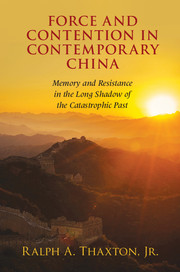 Force and Contention in Contemporary China
Force and Contention in Contemporary China Book contents
- Frontmatter
- Dedication
- Contents
- List of Illustrations
- Acknowledgments
- Cast of Characters for Da Fo Village and Several Other Villages in the Hebei-Shandong-Henan Border Area, 1945–2013
- Maps
- Introduction
- 1 The Violent Dawn of Reform
- 2 Contemporary Tax Resistance and the Memory of the Great Leap
- 3 Birth Planning and Popular Resistance
- 4 Rural Schools and the “Best Citizens of the State”: The Struggle for Knowledge and Empowerment in the Aftermath of the Great Leap
- 5 Official Corruption and Popular Contention in the Reform Era
- 6 The Rise of the Electricity Tigers: Monopoly, Corruption, and Memory
- 7 The Defeat of the Democratic Experiment and Its Consequences
- 8 Contentious Petitioners and the Revival of Mao-Era Repression
- 9 Migration and Contention in the Construction Sector
- 10 The Rise of the Martial Artists and the Two Faces of Mafia
- Conclusion: Big Questions and Small Answers from Da Fo
- Bibliography
- Index
- Miscellaneous Endmatter
1 - The Violent Dawn of Reform
Published online by Cambridge University Press: 05 August 2016
- Frontmatter
- Dedication
- Contents
- List of Illustrations
- Acknowledgments
- Cast of Characters for Da Fo Village and Several Other Villages in the Hebei-Shandong-Henan Border Area, 1945–2013
- Maps
- Introduction
- 1 The Violent Dawn of Reform
- 2 Contemporary Tax Resistance and the Memory of the Great Leap
- 3 Birth Planning and Popular Resistance
- 4 Rural Schools and the “Best Citizens of the State”: The Struggle for Knowledge and Empowerment in the Aftermath of the Great Leap
- 5 Official Corruption and Popular Contention in the Reform Era
- 6 The Rise of the Electricity Tigers: Monopoly, Corruption, and Memory
- 7 The Defeat of the Democratic Experiment and Its Consequences
- 8 Contentious Petitioners and the Revival of Mao-Era Repression
- 9 Migration and Contention in the Construction Sector
- 10 The Rise of the Martial Artists and the Two Faces of Mafia
- Conclusion: Big Questions and Small Answers from Da Fo
- Bibliography
- Index
- Miscellaneous Endmatter
Summary
When Mao died in September 1976, China's rural people were still suffering from the impact of his party's great famine. In much of the countryside per capita total daily consumption was below the poverty line, and material deprivation was shocking. In some villages of the Hebei-Shandong-Henan border area, where I interviewed in the following decade, dollar-poverty measures actually rivaled those of poverty-stricken Malawi, Niger, and Sierra Leone. Mao-era disasters, especially the Great Leap famine, had set rural China's economy back to the level of development that obtained in 1928. As Elizabeth Gooch has demonstrated, even with the post-1978 economic improvement, the imprint of the great famine's intensity seriously hindered the recovery of social well-being. With Mao gone, Beijing-centered reformers started to move rural China out of this predicament, or so it seemed.
Convened during late December 1978 in Beijing, the Third Plenum of the Central Committee of the Chinese Communist Party (CCP) solidified the triumph of Deng Xiaoping and his reform agenda, which called for market-driven economic growth and political stability aimed at setting China on a pragmatic course of modern national development. When it came to restructuring the rural economy, this new course would be free of damaging party-state interventions in the habitual survival routines of the rural poor – or so it seemed. Assuming this was the case, Harry Harding proclaimed that the Central government was engineering a “Second Revolution” under Deng. And indeed, the post-Mao center's policy-making process raised the hopes of rural dwellers: the reformers apparently intended to enable farm people to abandon monocropping of grain for a diversified pattern of agriculture, to sell their crops to the state at higher prices, to garner off-farm income through petty trade in reinvigorated local markets, and to break away from the bondage of the collective by pursuing jobs in rural township-based factories and in urban-centered construction work.
Da Fo's farmers by and large welcomed this liberation from the Maoist collective. After all, as I demonstrated in Catastrophe and Contention in Rural China, in the two decades following Mao's Great Leap famine, many of them had waged day-by-day, year-by-year struggles to escape state control of their attempts to scratch out a living.
- Type
- Chapter
- Information
- Force and Contention in Contemporary ChinaMemory and Resistance in the Long Shadow of the Catastrophic Past, pp. 34 - 65Publisher: Cambridge University PressPrint publication year: 2016


